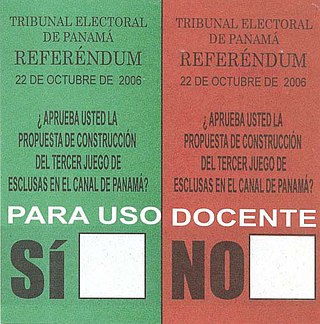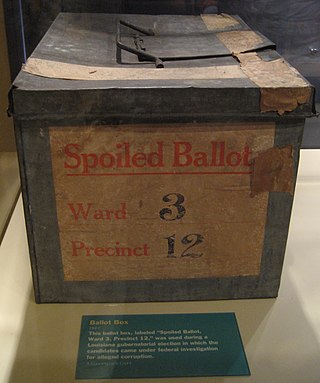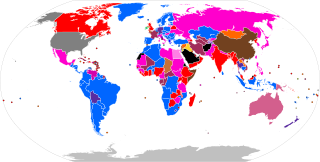
An election is a formal group decision-making process by which a population chooses an individual or multiple individuals to hold public office.

The two-round system (TRS), also known as runoff voting, second ballot, or ballotage, is a voting method used to elect a single candidate, where voters cast a single vote for their preferred candidate. It generally ensures a majoritarian result, not a simple-plurality result as under first past the post. Under the two-round election system, the election process usually proceeds to a second round only if in the first round no candidate received a simple majority of votes cast, or some other lower prescribed percentage. Under the two-round system, usually only the two candidates who received the most votes in the first round, or only those candidates who received above a prescribed proportion of the votes, are candidates in the second round. Other candidates are excluded from the second round.

The single transferable vote (STV), sometimes known as proportional ranked choice voting (P-RCV), is a multi-winner electoral system in which each voter casts a single vote in the form of a ranked-choice ballot. Voters have the option to rank candidates, and their vote may be transferred according to alternate preferences if their preferred candidate is eliminated or elected with surplus votes, so that their vote is used to elect someone they prefer over others in the running. STV aims to approach proportional representation based on votes cast in the district where it is used, so that each vote is worth about the same as another. Formally, STV satisfies a fairness criterion known as proportionality for solid coalitions.

Voting is a method by which a group, such as a meeting or an electorate, convenes together for the purpose of making a collective decision or expressing an opinion usually following discussions, debates or election campaigns. Democracies elect holders of high office by voting. Residents of a jurisdiction represented by an elected official are called "constituents", and the constituents who choose to cast a ballot for their chosen candidate are called "voters." There are different systems for collecting votes, but while many of the systems used in decision-making can also be used as electoral systems, any which cater to proportional representation can only be used in elections.
Primary elections, or direct primary are voting processes by which voters can indicate their preference for their party's candidate, or a candidate in general, in an upcoming general election, local election, or by-election. Depending on the country and administrative divisions within the country, voters might consist of the general public in what is called an open primary, or solely the members of a political party in what is called a closed primary. In addition to these, there are other variants on primaries that are used by many countries holding elections throughout the world.
A ballot is a device used to cast votes in an election and may be found as a piece of paper or a small ball used in voting. It was originally a small ball used to record decisions made by voters in Italy around the 16th century.
Electoral fraud, sometimes referred to as election manipulation, voter fraud, or vote rigging, involves illegal interference with the process of an election, either by increasing the vote share of a favored candidate, depressing the vote share of rival candidates, or both. It differs from but often goes hand-in-hand with voter suppression. What exactly constitutes electoral fraud varies from country to country, though the goal is often election subversion.

A protest vote is a vote cast in an election to demonstrate dissatisfaction with the choice of candidates or the current political system. Protest voting takes a variety of forms and reflects numerous voter motivations, including political apathy. Where voting is compulsory, casting a blank vote is available for those who do not wish to choose a candidate, or to protest. Unlike abstention elsewhere, blank votes are counted.

The secret ballot, also known as the Australian ballot, is a voting method in which a voter's identity in an election or a referendum is anonymous. This forestalls attempts to influence the voter by intimidation, blackmailing, and potential vote buying. This system is one means of achieving the goal of political privacy.
A straw poll, straw vote, or straw ballot is an ad hoc or unofficial vote. It is used to show the popular opinion on a certain matter, and can be used to help politicians know the majority opinion and help them decide what to say in order to gain votes.
"None of the above" (NOTA), or none for short, also known as "against all" or a "scratch" vote, is a ballot option in some jurisdictions or organizations, designed to allow the voter to indicate disapproval of the candidates in a voting system. It is based on the principle that consent requires the ability to withhold consent in an election, just as they can by voting "No" on ballot questions. It must be contrasted with "abstention", in which a voter does not cast a ballot.

In the politics of the United States, elections are held for government officials at the federal, state, and local levels. At the federal level, the nation's head of state, the president, is elected indirectly by the people of each state, through an Electoral College. Today, these electors almost always vote with the popular vote of their state. All members of the federal legislature, the Congress, are directly elected by the people of each state. There are many elected offices at state level, each state having at least an elective governor and legislature. There are also elected offices at the local level, in counties, cities, towns, townships, boroughs, and villages; as well as for special districts and school districts which may transcend county and municipal boundaries.
An absentee ballot is a vote cast by someone who is unable or unwilling to attend the official polling station to which the voter is normally allocated. Methods include voting at a different location, postal voting, proxy voting and online voting. Increasing the ease of access to absentee ballots is seen by many as one way to improve voter turnout through convenience voting, though some countries require that a valid reason, such as infirmity or travel, be given before a voter can participate in an absentee ballot. Early voting overlaps with absentee voting. Early voting includes votes cast before the official election day(s), by mail, online or in-person at voting centers which are open for the purpose. Some places call early in-person voting a form of "absentee" voting, since voters are absent from the polling place on election day.

Chief Moshood Kashimawo Olawale Abiola, also known as M. K. O. Abiola was a Nigerian businessman, publisher, and politician. He was the honorary supreme military commander of the Oyo Empire and an aristocrat of the Egba clan.

Babagana Kingibe OV GCON is a Nigerian diplomat, politician and civil servant who has held several high ranking government offices, culminating in his appointment as the Secretary to the Government of the Federation from 2007 to 2008. He spent over a decade in the Foreign Service cadre and has been in politics since the 1970s serving six heads of state; most recently as a member of the inner circle of President Muhammadu Buhari.
The Social Democratic Party of Nigeria (SDP) is a centre-left political party in Nigeria. It was created alongside the National Republican Convention by former military president Ibrahim Babangida, as part of a democracy project meant to form two detribalized political parties – one slightly to the left and one to the right. During the Nigerian Third Republic it was seen as a moderate party attractive to young radical intellectuals and socialists. In its manifesto, it called for concerted efforts to improve welfare and fight for social justice.
Electoral reform in the United States refers to efforts to change American elections and the electoral system used in the United States.
Professor Humphrey Nwosu. He was chairman of the National Electoral Commission (NEC) appointed by President Ibrahim Babangida. An office he held from 1989 to 1993.

An electoral system or voting system is a set of rules that determine how elections and referendums are conducted and how their results are determined. Electoral systems are used in politics to elect governments, while non-political elections may take place in business, non-profit organisations and informal organisations. These rules govern all aspects of the voting process: when elections occur, who is allowed to vote, who can stand as a candidate, how ballots are marked and cast, how the ballots are counted, how votes translate into the election outcome, limits on campaign spending, and other factors that can affect the result. Political electoral systems are defined by constitutions and electoral laws, are typically conducted by election commissions, and can use multiple types of elections for different offices.

Presidential elections were held in Nigeria on 12 June 1993, the first since the 1983 military coup ended the country's Second Republic. The elections was the outcome of a transitional process to civilian rule spearheaded by the military ruler, Ibrahim Badamasi Babangida. The unofficial result of the election – though not declared by the National Electoral Commission (NEC) – indicated a victory for Moshood Kashimawo Olawale Abiola of the Social Democratic Party (SDP), who defeated Bashir Tofa of the National Republican Convention (NRC). The winner of the election was thus never declared as the elections were annulled by Babangida, citing electoral irregularities. The annulment led to protests and political unrest, including the resignation of IBB and a weak interim civilian government, and culminated in the continuation of military rule in the country with Sani Abacha ascending to power as the military head of state via a bloodless coup later in the year.










